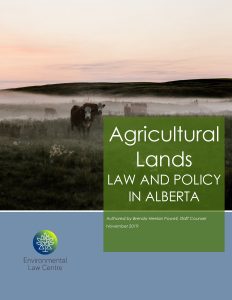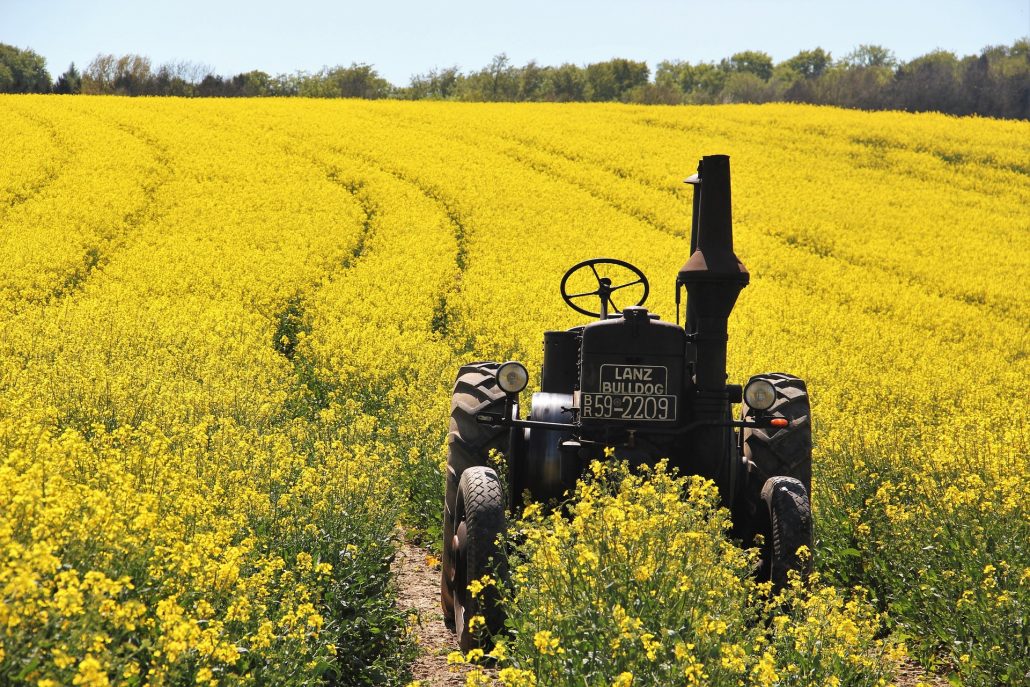Moving from Conversion to Conservation: ELC publishes Agricultural Lands Law and Policy in Alberta

Alberta’s agricultural lands support numerous social, economic and environmental benefits. Despite this, we have lost and continue to lose prime agricultural lands via conversion into developed uses. As well, Alberta’s agricultural lands have become significantly more fragmented around Edmonton, Calgary, Red Deer, and along the Edmonton-Calgary corridor. For more detail, see the Alberta Land Institute’s Economic Evaluation of Farmland Conversion and Fragmentation in Alberta, Summary of Findings and our previous posts here and here.
[sdm_download id=”90602″ fancy=”0″]
The ELC Agricultural Lands Project
With the support of our donors and noted experts in the field, the ELC is currently working on a project exploring the challenges and opportunities for stopping the loss of Alberta’s agricultural lands. We announce the publication of this report which is the first of two that aim to answer how to move from conversion to conservation of Alberta’s agricultural lands. In this report, the ELC provides:
- A primer on the laws and policies which apply to Alberta’s agricultural lands from the perspectives of planning, development and conservation; and
- An effective canvassing of the existing legal tools relevant to conversion and conservation of agricultural lands in Alberta.
The second report will provide a gap analysis of Alberta’s laws and policies to identify the legal challenges of moving from conversion to conservation of agricultural lands; look at other jurisdictions for alternative approaches for minimizing agricultural land fragmentation and loss, and for ensuring sustainable agriculture which could be adopted in Alberta; and make recommendations for legal and policy reform.
The First Report: Agricultural Lands Law and Policy in Alberta
[sdm_download id=”90602″ fancy=”0″]
There is a significant amount of law and policy regulating agricultural activities and impacting upon agricultural lands. These include laws and principles relating to land, water, and to agricultural practices and operations, as well as legislation such as the Alberta Land Stewardship Act (ALSA) and the Municipal Government Act (MGA). There are also a variety of financial tools, including taxation, that impact upon agricultural lands.
Despite this significant body of law, a coherent and comprehensive agricultural lands policy is missing in Alberta. By filling this gap, land planning and development – at both the regional level under ALSA and the municipal level under the MGA – could be directed with a clear view toward to avoiding further agricultural land conversion and fragmentation. Provincial policy is needed to set priorities, address conflicts (between agricultural and urban activities, as well as conflicting agricultural activities such as conversion of rangelands to cultivated lands), and set objectives.
In addition to providing direction through policy, there must be support provided with appropriate legislative tools and funding. Some tools are already enabled in legislation – such as the ALSA stewardship tools and intermunicipal planning – however, there is a need for additional regulation to effectively implement and enforce these tools. Furthermore, financial support is needed to fund stewardship programs (for example: conservation easements, payment for ecological goods and services). It may also be appropriate to encourage non-regulatory mechanisms (such as voluntary programs or market-driven incentives) to address the issue of agricultural land conversion and fragmentation.
The Path Forward
The second report in this project will make recommendations for legal and policy reform. This will require analysis of the application and effectiveness of regulatory and non-regulatory tools currently available in Alberta (including market-based tools, taxation, and zoning). Further, the ELC will look to experiences in other jurisdictions – which may have additional or alternative approaches – that can inform Alberta’s law and policies.
Ultimately, the ELC’s goal with this project is to achieve clear policy direction at the provincial level which supports the conservation of agricultural land and is guided by environmental principles; sustainable agriculture within the framing of sustainable development.


This project is made possible through a grant from the Alberta Real Estate Foundation and an anonymous foundation.
The Alberta Real Estate Foundation supports real estate related initiatives that enhance the industry and benefit the people of Alberta. The Foundation’s revenues come from the interest earned on public money deposited in real estate brokers’ pooled trust accounts. Learn more at www.aref.ab.ca
ABOUT THE ENVIRONMENTAL LAW CENTRE:
The Environmental Law Centre (ELC) has been seeking strong and effective environmental laws since it was founded in 1982. The ELC is dedicated to providing credible, comprehensive and objective legal information regarding natural resources, energy and environmental law, policy and regulation in Alberta. The ELC’s mission is to educate and champion for strong laws and rights so all Albertans can enjoy clean water, clean air and a healthy environment. Our vision is a society where laws secure an environment that sustains current and future generations.
As a charity, the Environmental Law Centre depends on your financial support. Help us to continue to educate and champion for strong environmental laws, through tools such as our blog and all of our other resources, so that all Albertans can enjoy a healthy environment. Your support makes a difference.
Donate online today
